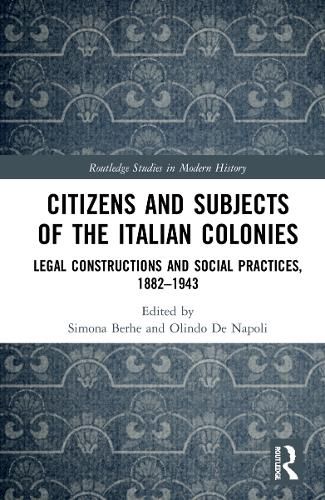Readings Newsletter
Become a Readings Member to make your shopping experience even easier.
Sign in or sign up for free!
You’re not far away from qualifying for FREE standard shipping within Australia
You’ve qualified for FREE standard shipping within Australia
The cart is loading…






This is the first book on Italian colonialism that specifically deals with the question of citizenship/subjecthood. Such a topic is crucial for understanding both Italian imperial rule and the complex dynamics of the different colonial societies where several actors, like notables, political leaders, minorities, etc., were involved.
The chapters gathered in the book constitute an unprecedented account of a heterogeneous geographical area. The cases of Eritrea, Libya, Dodecanese, Ethiopia, and Albania confirm that citizenship and subjecthood in the colonial context were ductile political tools, which were structured according to the orientations of the Metropole and the challenges that came from the colonial societies, often swinging between submission, cooptation to the colonial power, and resistance.
On one hand, the book offers an account of the different policies of citizenship implemented in the Italian colonies, in particular the construction of gradated forms of citizenship, the repression and expulsion of dissidents, the systems of endearment of local people and cooptation of the elites, and the racialization of legal status. On the other, it deals with the various answers coming from the local populations in terms of resistance, negotiation, and construction of social identity.
$9.00 standard shipping within Australia
FREE standard shipping within Australia for orders over $100.00
Express & International shipping calculated at checkout
This is the first book on Italian colonialism that specifically deals with the question of citizenship/subjecthood. Such a topic is crucial for understanding both Italian imperial rule and the complex dynamics of the different colonial societies where several actors, like notables, political leaders, minorities, etc., were involved.
The chapters gathered in the book constitute an unprecedented account of a heterogeneous geographical area. The cases of Eritrea, Libya, Dodecanese, Ethiopia, and Albania confirm that citizenship and subjecthood in the colonial context were ductile political tools, which were structured according to the orientations of the Metropole and the challenges that came from the colonial societies, often swinging between submission, cooptation to the colonial power, and resistance.
On one hand, the book offers an account of the different policies of citizenship implemented in the Italian colonies, in particular the construction of gradated forms of citizenship, the repression and expulsion of dissidents, the systems of endearment of local people and cooptation of the elites, and the racialization of legal status. On the other, it deals with the various answers coming from the local populations in terms of resistance, negotiation, and construction of social identity.